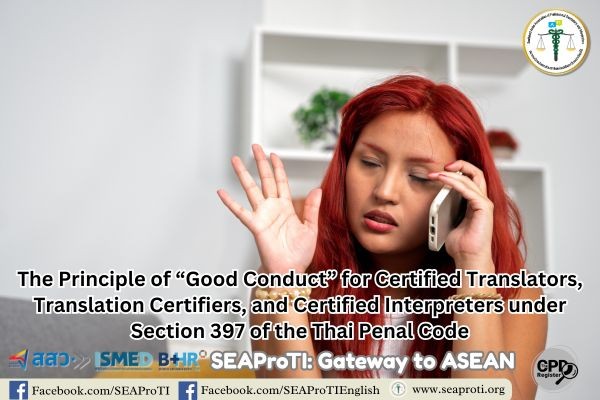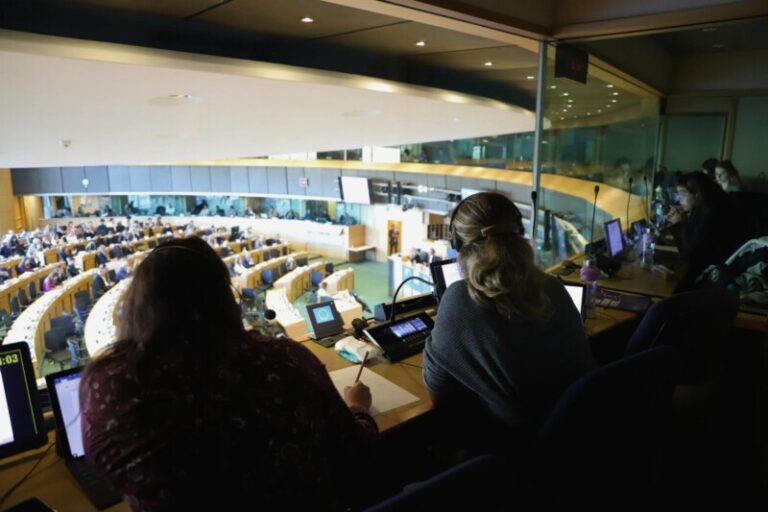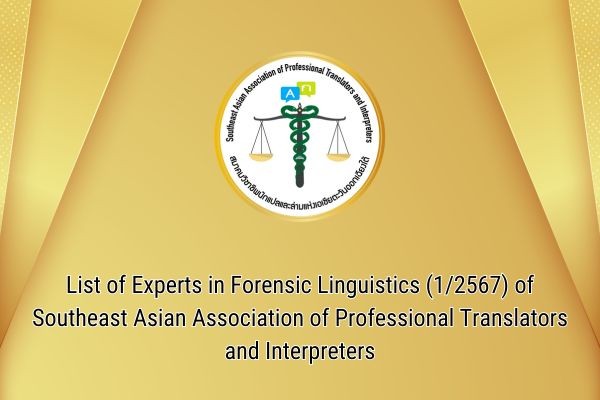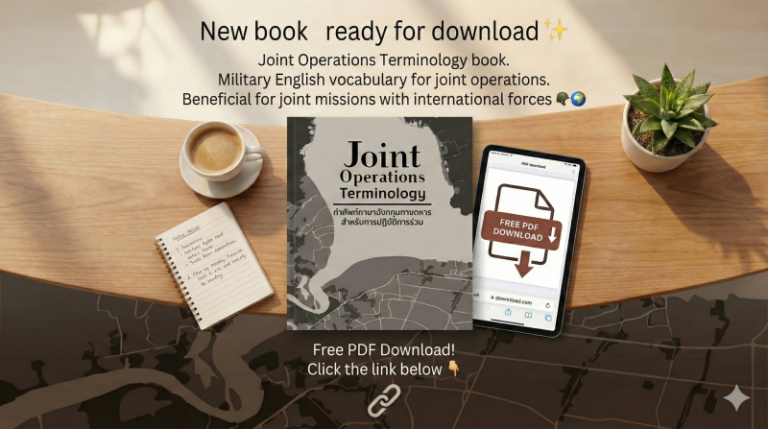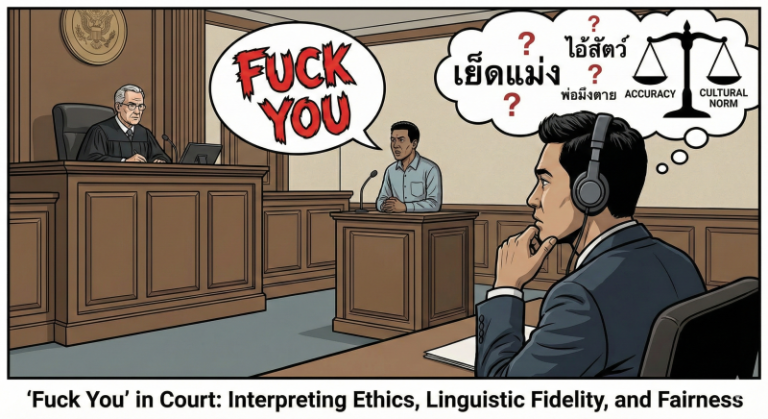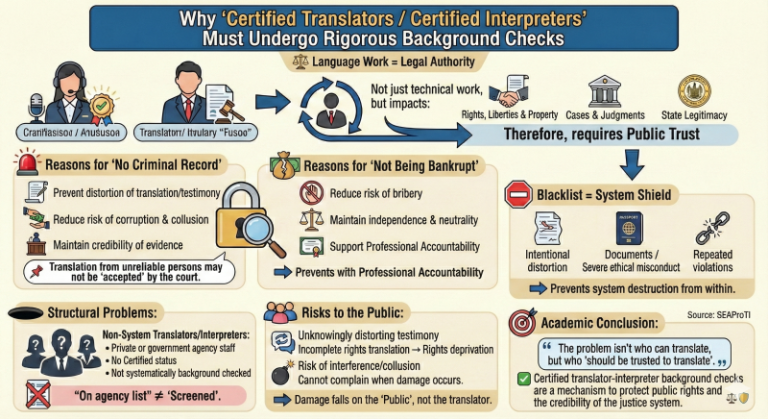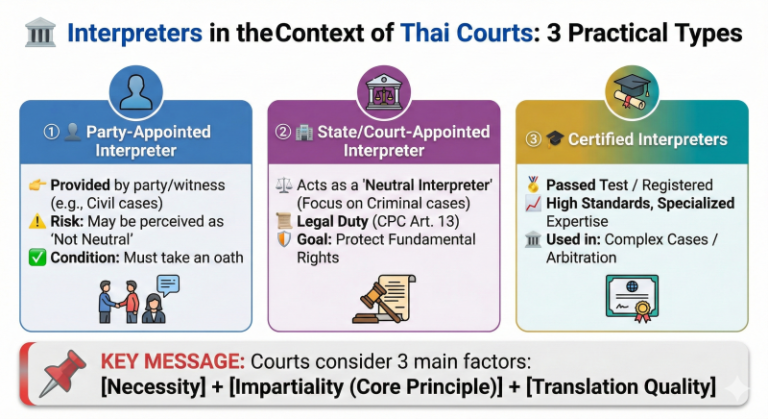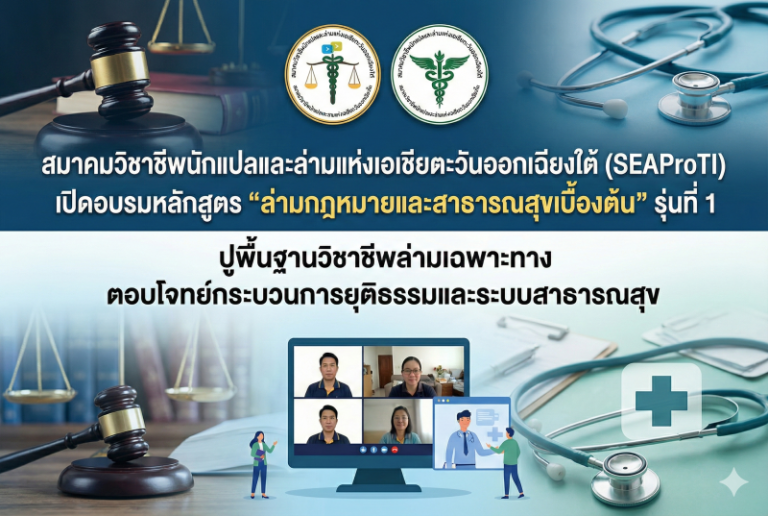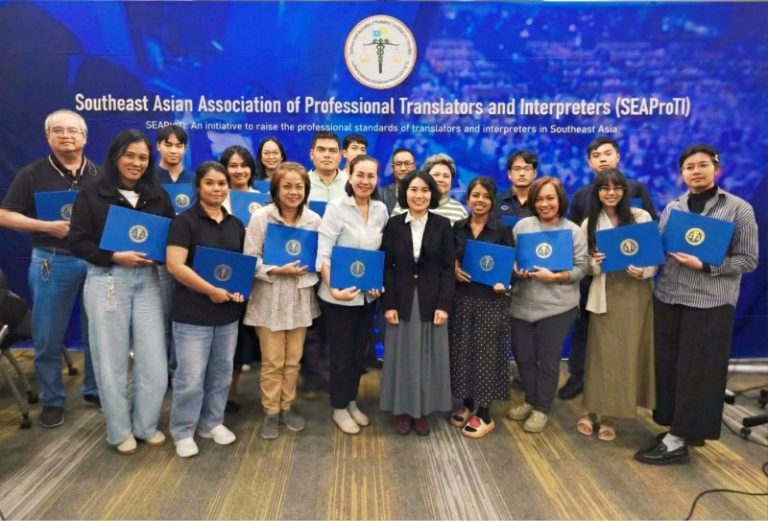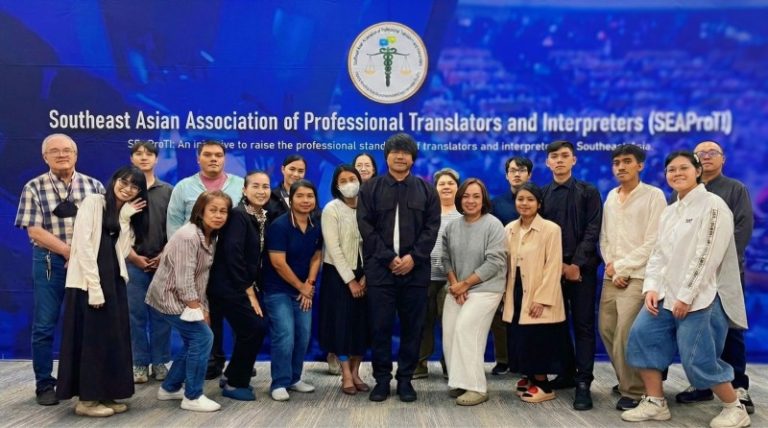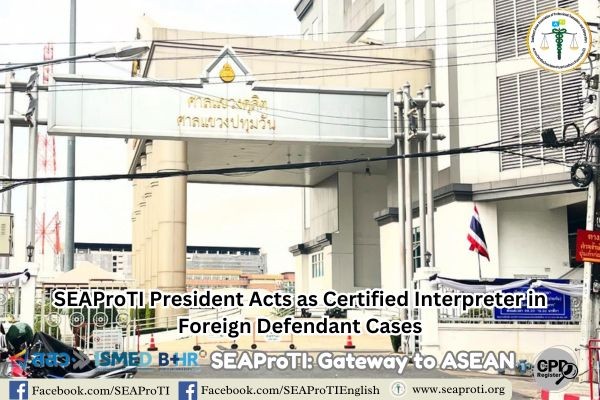The Principle of “Good Conduct” for Certified Translators, Translation Certifiers,
and Certified Interpreters under Section 397 of the Thai Penal Code
17 October 2025, Bangkok – In the translation and interpreting profession, credibility is measured not only by linguistic skill but also by professional conduct and ethical behavior. The Southeast Asian Association of Professional Translators and Interpreters (SEAProTI) recognizes “good conduct” as a fundamental qualification for all Certified Translators, Translation Certifiers, and Certified Interpreters. This principle emphasizes the importance of maintaining a standard of behavior that avoids causing public nuisance, embarrassment, or reputational harm to others and the profession at large.
Relevant Legal Foundation
The principle of “good conduct” aligns closely with Section 397 of the Thai Penal Code, which provides that:
- “Whoever, without justifiable cause, causes another person to be ashamed, annoyed, or humiliated in public shall be punished with a fine not exceeding one thousand Baht.” (Thai Penal Code, Section 397)
This section aims to protect individual dignity and social order by prohibiting acts that cause public disturbance or humiliation, even if the act does not amount to a serious crime.
Application in Professional Ethics
SEAProTI integrates this legal provision into its professional ethics to ensure that certified translators and interpreters maintain decorum and integrity in all aspects of their work and public interactions. Accordingly, members must:
- Refrain from causing nuisance or disturbance to others, including verbal abuse, insults, or offensive communication in public or professional contexts.
- Avoid misuse of social media for defamation, ridicule, or disclosure of others’ private information without consent.
- Demonstrate proper manners and speech befitting their professional status, especially in public or during assignments.
- Avoid behavior that undermines the credibility of the profession, such as personal conflicts, public altercations, or spreading false information about colleagues or institutions.
Ethical Dimensions of “Good Conduct”
“Good conduct” in professional terms extends beyond the absence of legal violations. It encompasses both social ethics; the respect and courtesy owed to others and professional ethics, which safeguard the public’s trust in translators and interpreters.
Since certified translators and interpreters handle sensitive legal, governmental, and judicial documents, maintaining moral integrity and impartiality is essential. Their conduct directly influences public confidence in official translations and in the justice system that depends on them.
Conclusion
The principle of “good conduct” under SEAProTI merges legal responsibility and professional ethics, drawing from Section 397 of the Penal Code to uphold both personal dignity and public trust. Translators and interpreters who adhere to this standard not only comply with the law but also embody the values of respect, responsibility, and professionalism—preserving the honor and credibility of the linguistic profession.
References (APA Style)
- Criminal Code of Thailand. (1956). Section 397.
- Southeast Asian Association of Professional Translators and Interpreters. (2025). Code of Ethics and Certification Guidelines for Translators and Interpreters. Bangkok: SEAProTI.
- Thongchai Winichakul. (2020). General Principles of Criminal Law. Bangkok: Thammasat University Press.
- Worajet Pakeerut. (2019). Introduction to Criminal Law. Bangkok: Winyuchon Publishing House.
About Certified Translators, Translation Certifiers, and Certified Interpreters of SEAProTI
The Southeast Asian Association of Professional Translators and Interpreters (SEAProTI) has formally announced the qualifications and requirements for registration of Certified Translators, Translation Certification Providers, and Certified Interpreters in Sections 9 and 10 of the Royal Gazette, published by the Secretariat of the Cabinet, Office of the Prime Minister of Thailand, on 25 July 2024 (Vol. 141, Part 66 Ng, p. 100). Certified Translators, Translation Certification Providers, and Certified Interpreters
The Council of State has proposed the enactment of a Royal Decree, granting registered translators and recognized translation certifiers from professional associations or accredited language institutions the authority to provide legally valid translation certification (Letter to SEAProTI dated April 28, 2025)
SEAProTI is the first professional association in Thailand and Southeast Asia to implement a comprehensive certification system for translators, certifiers, and interpreters.
Head Office: Baan Ratchakru Building, No. 33, Room 402, Soi Phahonyothin 5, Phahonyothin Road, Phaya Thai District, Bangkok 10400, Thailand
Email: hello@seaproti.com | Tel.: (+66) 2-114-3128 (Office hours: Mon–Fri, 09:00–17:00)
หลักการ “เป็นผู้ที่มีความประพฤติดี” ของนักแปลรับรอง ผู้รับรองการแปล และล่ามรับรอง ตามกฎหมายอาญา มาตรา 397
17 ตุลาคม 2568, กรุงเทพมหานคร – ในวิชาชีพนักแปลและล่าม ความน่าเชื่อถือไม่ได้วัดจากทักษะทางภาษาเพียงอย่างเดียว หากแต่รวมถึง “ความประพฤติ” อันเหมาะสมและสอดคล้องกับจริยธรรมวิชาชีพด้วย สมาคมวิชาชีพนักแปลและล่ามแห่งเอเชียตะวันออกเฉียงใต้ (SEAProTI) ได้กำหนดให้คุณสมบัติสำคัญของผู้ที่จะเป็นนักแปลรับรอง ผู้รับรองการแปล และล่ามรับรอง ต้องเป็น “ผู้ที่มีความประพฤติดี” ซึ่งหมายถึงการไม่ประพฤติในทางที่สร้างความเดือดร้อนรำคาญ หรือก่อให้เกิดความเสื่อมเสียต่อผู้อื่นและต่อวิชาชีพ
หลักการ “ความประพฤติดี” ดังกล่าวสอดคล้องโดยตรงกับ ประมวลกฎหมายอาญา มาตรา 397 ซึ่งบัญญัติว่า
- “ผู้ใดกระทำโดยไม่มีเหตุอันสมควร ให้ผู้อื่นได้รับความอับอายเดือดร้อนรำคาญ หรือได้รับความอัปยศในที่สาธารณะ ต้องระวางโทษปรับไม่เกินหนึ่งพันบาท”
(ประมวลกฎหมายอาญา, มาตรา 397)
SEAProTI ได้นำหลักการตามกฎหมายอาญามาตรา 397 มาประยุกต์ใช้ในจรรยาบรรณวิชาชีพ เพื่อกำหนดมาตรฐานความประพฤติของนักแปลและล่ามรับรองให้สอดคล้องกับคุณธรรม จริยธรรม และความรับผิดชอบต่อสาธารณะ
นักแปลรับรองและล่ามรับรองจึงต้อง
- ไม่กระทำการใด ๆ ที่ก่อให้เกิดความเดือดร้อนรำคาญแก่ผู้อื่น เช่น การสื่อสารด้วยถ้อยคำหยาบคาย ดูหมิ่น หรือเหยียดหยามบุคคลหรือองค์กร
- ไม่ใช้สื่อสังคมออนไลน์ในทางที่เป็นอันตรายต่อชื่อเสียงของผู้อื่น เช่น การโพสต์ข้อความพาดพิง เสียดสี หรือเปิดเผยข้อมูลส่วนบุคคลโดยไม่ได้รับอนุญาต
- รักษากิริยาและวาจาให้เหมาะสมกับฐานะผู้ประกอบวิชาชีพ โดยเฉพาะในที่สาธารณะหรือระหว่างปฏิบัติงานแปลและล่าม
- หลีกเลี่ยงพฤติกรรมที่บั่นทอนความเชื่อถือในวิชาชีพ เช่น การทะเลาะวิวาท การกล่าวร้ายเพื่อนร่วมวิชาชีพ หรือการเผยแพร่ข้อมูลที่ทำให้สมาคมหรือองค์กรเสียหาย
คำว่า “ความประพฤติดี” ในทางวิชาชีพไม่ได้หมายถึงเพียงการไม่ทำผิดกฎหมายเท่านั้น แต่ยังหมายถึงการมีจริยธรรมทางสังคม (social ethics) และจรรยาบรรณทางวิชาชีพ (professional ethics) ที่สะท้อนถึงความเคารพต่อผู้อื่น ความสุภาพอ่อนน้อม และการปฏิบัติตนในลักษณะที่สร้างความไว้วางใจในสังคม
ในฐานะที่นักแปลและล่ามรับรองเป็นผู้ให้บริการทางภาษาที่เกี่ยวข้องกับเอกสารราชการ กฎหมาย และกระบวนการยุติธรรม “ความประพฤติดี” จึงเป็นรากฐานสำคัญของความน่าเชื่อถือ (credibility) และความเป็นกลาง (impartiality) ของผู้ประกอบวิชาชีพ
บทสรุป
หลักการ “เป็นผู้ที่มีความประพฤติดี” ของนักแปลรับรอง ผู้รับรองการแปล และล่ามรับรอง ภายใต้ SEAProTI เป็นการผสานระหว่าง จริยธรรมทางวิชาชีพกับกฎหมายอาญา โดยเฉพาะมาตรา 397 ที่มุ่งคุ้มครองศักดิ์ศรีและความสงบเรียบร้อยของสังคม นักแปลและล่ามที่ปฏิบัติตนตามหลักการนี้ไม่เพียงแต่หลีกเลี่ยงการกระทำผิดทางกฎหมาย แต่ยังคงไว้ซึ่งเกียรติภูมิของวิชาชีพและความไว้วางใจจากสาธารณชน
- ประมวลกฎหมายอาญา. (พ.ศ. 2499). มาตรา 397.
- สมาคมวิชาชีพนักแปลและล่ามแห่งเอเชียตะวันออกเฉียงใต้. (2568). จรรยาบรรณและหลักเกณฑ์การรับรองนักแปลและล่ามรับรอง. กรุงเทพฯ: SEAProTI.
- ธงชัย วินิจจะกูล. (2563). กฎหมายอาญาภาคทั่วไป. กรุงเทพฯ: สำนักพิมพ์มหาวิทยาลัยธรรมศาสตร์.
- วรเจตน์ ภาคีรัตน์. (2562). หลักกฎหมายอาญาเบื้องต้น. กรุงเทพฯ: สำนักพิมพ์วิญญูชน.
สมาคมวิชาชีพนักแปลและล่ามแห่งเอเชียตะวันออกเฉียงใต้ (SEAProTI) ได้ประกาศหลักเกณฑ์และคุณสมบัติผู้ที่ขึ้นทะเบียนเป็น “นักแปลรับรอง (Certified Translators) และผู้รับรองการแปล (Translation Certification Providers) และล่ามรับรอง (Certified Interpreters)” ของสมาคม หมวดที่ 9 และหมวดที่ 10 ในราชกิจจานุเบกษา ของสำนักเลขาธิการคณะรัฐมนตรี ในสำนักนายกรัฐมนตรี แห่งราชอาณาจักรไทย ลงวันที่ 25 ก.ค. 2567 เล่มที่ 141 ตอนที่ 66 ง หน้า 100 อ่านฉบับเต็มได้ที่: นักแปลรับรอง ผู้รับรองการแปล และล่ามรับรอง
สำนักคณะกรรมการกฤษฎีกาเสนอให้ตราเป็นพระราชกฤษฎีกา โดยกำหนดให้นักแปลที่ขึ้นทะเบียน รวมถึงผู้รับรองการแปลจากสมาคมวิชาชีพหรือสถาบันสอนภาษาที่มีการอบรมและขึ้นทะเบียน สามารถรับรองคำแปลได้ (จดหมายถึงสมาคม SEAProTI ลงวันที่ 28 เม.ย. 2568)
สมาคมวิชาชีพนักแปลและล่ามแห่งเอเชียตะวันออกเฉียงใต้ เป็นสมาคมวิชาชีพแห่งแรกในประเทศไทยและภูมิภาคเอเชียตะวันออกเฉียงใต้ที่มีระบบรับรองนักแปลรับรอง ผู้รับรองการแปล และล่ามรับรอง
สำนักงานใหญ่: อาคารบ้านราชครู เลขที่ 33 ห้อง 402 ซอยพหลโยธิน 5 ถนนพหลโยธิน แขวงพญาไท เขตพญาไท กรุงเทพมหานคร 10400 ประเทศไทย
อีเมล: hello@seaproti.com โทรศัพท์: (+66) 2-114-3128 (เวลาทำการ: วันจันทร์–วันศุกร์ เวลา 09.00–17.00 น.)


